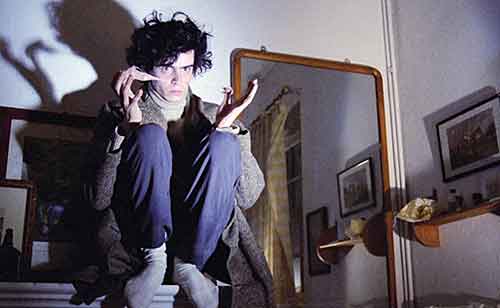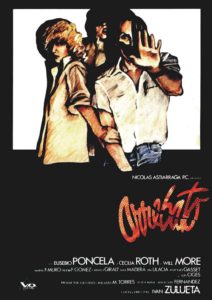The absolute last word on visual addiction, ARREBATO is a fascinating Spanish cult film. Drugs, vampirism and uncontrollable film fanaticism all figure into this little seen classic that bears quite a few similarities to David Cronenberg’s VIDEODROME, which it predated by five years.
Completed in 1979, ARREBATO is probably the most famous Spanish cult movie of all time. It’s been largely inaccessible in the years since its extremely limited original release and so has developed quite a mystique…among Spanish film buffs, at least (unsurprisingly, the film is almost completely unknown in America).
Director Ivan Zulueta was a highly praised experimental filmmaker back in the mid sixties and seventies, and made only one other feature (1969’s UN, DOS, TRES, AL ESCONDITE INGLES). He experienced a physical breakdown after completing ARREBATO, which was edited down from a reported three hours to its current 110 minute running time, and hasn’t made another feature since—which of course has only added to ARREBATO’S mythic status.

Jose is a filmmaker putting the finishing touches on his latest production, a schlocky vampire picture. Feeling supremely dissatisfied with his vocation and heroin addicted girlfriend Ana, he arrives back at his apartment to discover a package from his friend Pedro. It contains a reel of super 8mm film, an audiotape and a key to Pedro’s apartment.
Flashbacks show how these two men, both of whom share an extraordinary passion for filmmaking, met at Pedro’s family home where Jose was location scouting. Pedro, who’s never without his super 8mm camera, believes life is only worth anything if it’s caught on film. Furthermore, he’s tapped a hidden power inherent in film images that causes him to experience a mystical state of “Arrebato,” or rapture. Before long Pedro becomes addicted to this sensation, eventually cutting himself off from the outside world and devoting his life to filming himself in bed. His camera in turn grows increasingly powerful as it saps more and more of Pedro’s life force, eventually developing the capacity to turn itself on and off and, more alarmingly, literally erase objects—and, inevitably, people—from existence.
All this is evident on the film and tape Pedro has mailed to Jose, who in the end decides to visit his friend’s apartment. He arrives to find Pedro’s camera set up and running, but its owner nowhere to be found…
While this film lacks the hallucinatory pizzazz of the aforementioned VIDEODROME, it does have a compelling air of brooding mystery that’s all its own. It’s similar in tone to Pupi Avati’s quiet, largely bloodless mysteries THE HOUSE WITH LAUGHING WINDOWS and ZEDER: VOICES FROM BEYOND, both of which had slow, careful build-ups topped by stunning finales, which are definitely characteristics of ARREBATO. Its deeply haunting final scene is simply perfect, and could by itself be used as a visual dissertation on the uneasy relationship between cinema and reality.
The film also has an experimental edge in common with avant-garde filmmakers like Stan Brakhage and Jack Smith; Zulueta includes extensive footage of the pixilated home movies Pedro makes, which in their strangely compelling nonlinear weirdness are worthy of Brakhage or Smith. Zulueta does go overboard with his near-constant addiction symbolism (his characters always seem to be shooting up or nodding off), and his film’s trajectory may be a bit too relentlessly bleak for its own good (if there’s any intentional humor I missed it), but that’s as the subject matter demands. Frankly, I doubt there are too many filmmakers who could pull off the concept of film as a literal vampire with the seriousness and audacity with which Ivan Zulueta does here.
Vital Statistics
ARREBATO (RAPTURE; FIT)
Nicolas Asturriaga P.C.
Director: Ivan Zulueta
Producer: Miguel Bermejo
Screenplay: Ivan Zulueta
Cinematography: Angel Luis Fernandes
Cast: Eusebio Poncela, Will More, Cecilia Roth, Marta Fernandez Muro, Carmen Giralt, Helena Fernan-Gomez, Antonio Gasset, Luis Ciges, Javier Ulacia, Max Madera, Rosa Crespo


